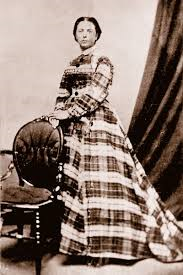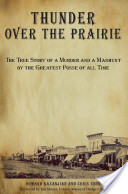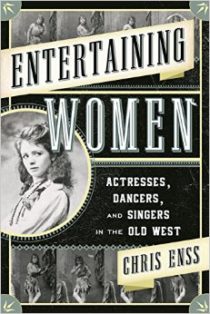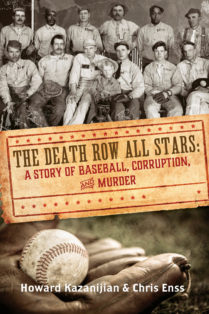Enter to win a copy of
Thunder Over the Prairie:
The Story of a Murder and a Manhunt by the
Greatest Posse of All Time.
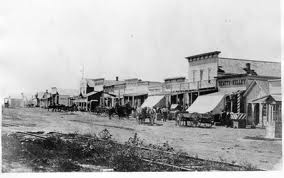
A crowd of Texas trail hands watched the prairie hurry past them as they pressed their rides into a full gallop. A whistle from a train racing in the opposite direction issued a long blast that floated over miles of grassy fields. Dr. Henry Hoyt, part-time cowboy and physician for the King Ranch, was out in front of the riders, an unlit cigar was clamped tightly between his jaws. Like the others on horseback beside him, he was dressed in rough clothing of the cattle trail. His tall hat was pushed back from his sunburned face. When he and his cohorts left Dodge City, they had in mind to intercept the posse pursuing James Kenedy and give the wealthy cattleman a chance to get out of the territory safely. Shortly after they started on their way, it was decided they should return to the ranch in southern Texas and inform James’s father about the incident involving his son.
The King Ranch, located between Corpus Christi and Brownsville, sprawled across six Texas counties. Hundreds of hands worked the more than twelve hundred and eighty mile spread. Dr. Hoyt suspected when Mifflin Kenedy learned about the trouble James was in, that he would dispatch a legion of dutiful men, indignant over the harsh treatment of a fellow Texan. Hundreds of discontented cowboys who believed their occasional, illegal actions deserved a free pass because of the hundreds of dollars they spent in Dodge, would go to great lengths to champion one another. Dr. Hoyt knew this and knew that Captain Kenedy was aware of it as well. Mifflin’s organized efforts on behalf of his son would be more effective than 25 or 30 rogue hands acting independently. It was with that thought in mind that Dr. Hoyt and friends headed off in the direction of the Chisholm Trail towards home.
A cold wind hissed through the cracks of the walls and doors of a sprawling, dilapidated mud and wood store near a place called Mulberry Crossing, 27 miles south of Dodge City. With the exception of an inebriated trail hand, the dusty stretch in front of the business was deserted and still. A weathered sign over the entrance read, A.H. Dugan, owner. Dugan, a heavy man who had sagging jowls and thinning black hair combed across his sweaty scalp, ran the stage stop which was a combination mercantile and saloon. He was wiping a mop rag over a rugged wood table when Bat Masterson and Bill Tilghman entered. Three riders with the look of seasoned cattlemen and the sound of Texas in their voices, were seated in the back of the room and looked up from their poker game at the police officers. The tension in the air seemed almost visible.
The cowboys continued on with their game as Bat and Bill meandered over to the bar. “It’s two bits for a bucket of water for your horses,” Dugan said, blowing the dust off a can of peaches and putting them back on the shelf. “We’re looking for someone who might have come by here,” Bat stated. “It’s still two bits,” Dugan replied unimpressed. The lawmen politely explained who they were looking for and described James Kenedy. Dugan told them no one that looked like Kenedy had been through. “And I would know,” he added. “I know every teamster, trail hand, and stage driver that passes by.”
Bat turned his attention to the men playing cards. The cowboys were too engrossed with their hands to care. Dugan told the officers that the ranchers were part of a nearby spread that had come in to load up on provisions and decided to stay for a game and a bottle. Satisfied with the response, Bat and Bill turned to leave. “What did this fellow do?” Dugan asked before the men reached the door. Bill told him that he’d shot a woman in Dodge. “She was a singer,” he elaborated. “Her name was Dora Hand.”
Dugan’s expression fell. He removed a bottle of cheap liquor from under the counter and poured himself a drink. “Damn shame,” he said sadly as he lifted the glass to his lips. “My sister dragged me to the Union church some months back,” Dugan confessed. “Miss Hand sang a solo. Prettiest thing I ever did hear.” The gruff businessman hummed a bit of the hymn he was recalling before asking Bill if he had known Dora. “Yes,” Bill kindly answered, “I knew her.” Before exiting the building, Bat warned Dugan and his patrons not to say anything about their passing through. “When you find the murderer, I hope you kill him,” Dugan snapped. “It may come to that,” Bat promised.
Wyatt and Charlie, who had been surveying the area around the primitive store, hopped aboard their horses at the same time Bat and Bill mounted up. Charlie let them know they hadn’t had any luck finding Kenedy’s tracks. “I think we need to get a wire to the Sheriff of Cheyenne,” Bat said adjusting himself in the saddle. “We’ve been through this, Bat,” Charlie announced. “Kenedy’s talk about Wyoming is a blind,” Bill added looking over the landscape. “He followed the Arkansas River way west and is going to cut across the Texas Trail and rejoin the Jones and Plummer Trail to get to the shallowest spot on the Cimmaron.” Bat resisted arguing with them further and led the riders back onto the wide-open plains. “Kenedy’s caught in his own loop,” Charlie interjected. “That’s about all there is of him. He doesn’t have none of his old Daddy, that’s why he’ll run home to him.”
Bill brought up the rear of the posse, his mind on the pursuit, the lateness of the day, and Dora Hand. “Half the population (of Dodge) were gamblers or prostitutes…,” Bill wrote to his wife Zoe, in 1877. “The prostitutes were painted up like a present day respectable woman, and looked mighty pretty in their satins and laces.” Dora was among those “painted ladies” he found appealing drifting across the stage in her stylish fineries. There were some Dodge City residents who suggested she was a soiled dove, but female entertainers west of Independence, Missouri were often viewed as harlots by the general population.
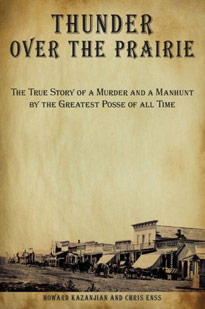
To learn more about the death of Dora Hand and the posse that tracked her killer read Thunder Over the Prairie.


